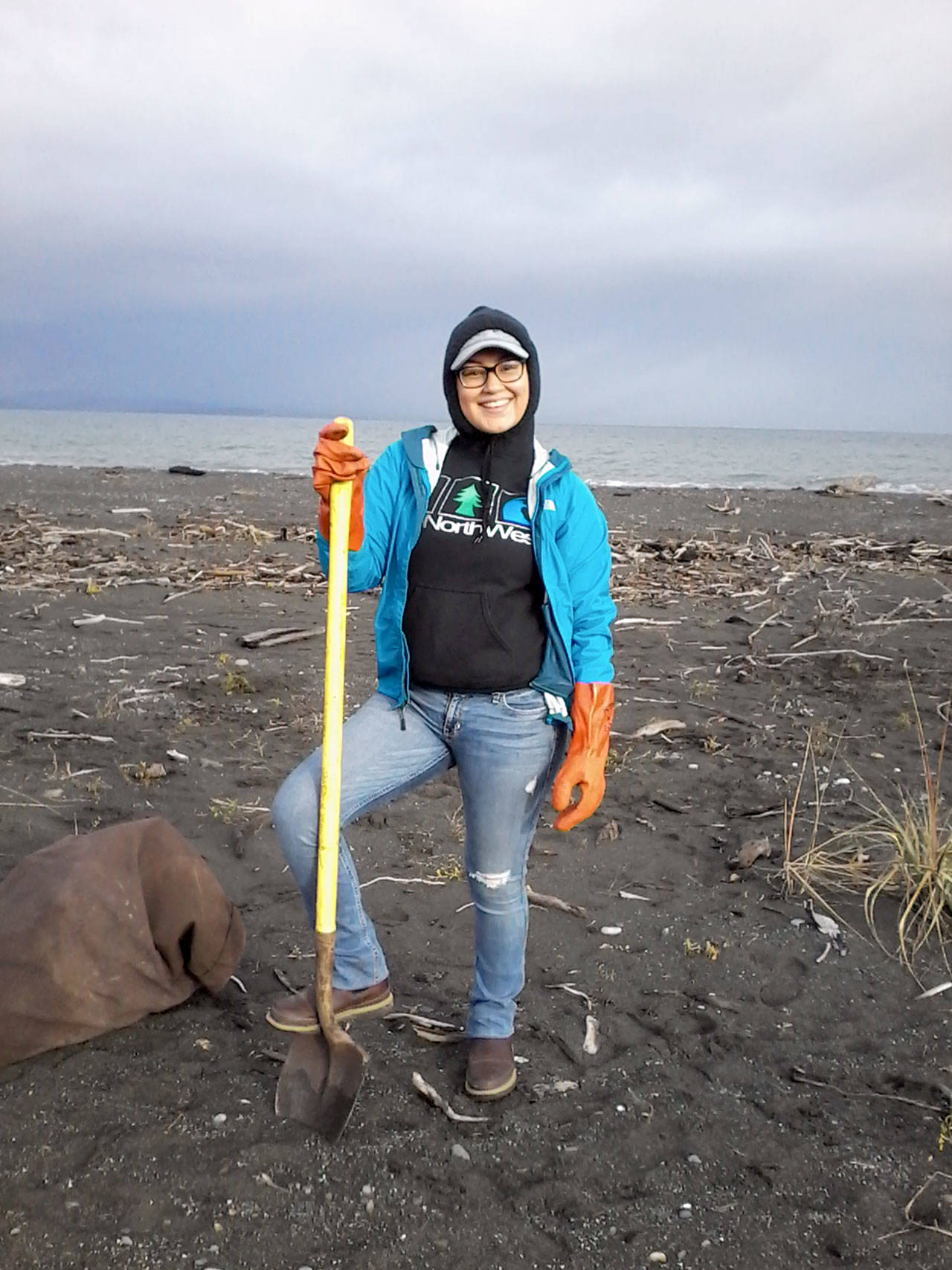PORT ANGELES — The last segment of a fish-blocking dam came down four years ago, but Elwha River restoration work continues.
Whale Scout volunteers and Northwest Indian College students — most from the Port Gamble S’Klallam and Suquamish tribes — planted 800 native plants on the east side of the mouth of the Elwha River on Jan. 27.
The planting was hosted by the Lower Elwha Klallam Tribe on newly created beach formed when decades of sediment were released after the removal of two Elwha River dams in a $324 million project.
The fish-blocking dams were removed between 2011 and 2014. The silt that has flowed down the river has created some 80 to 100 acres of new beach at the mouth of the Elwha River west of Port Angeles.
Most of the beach is on the east side of the mouth, according to Laurel Moulton, a horticulturist hired by the Lower Elwha Klallam Tribe who has worked for the last 3½ years as the assistant manager of Olympic National Park’s Matt Albright Native Plant Center.
Tribal lands on the east side of the mouth are not open to the public. The only present public access to the new beach at the mouth of the river is on the west bank, which is across private property and where parking and public services are very limited.
Catherine Youngman, who grew up on Lower Elwha Reservation, remembered the degraded beach prior to dam removal.
“Before the dams were removed, I remember my cousins and I would always walk down to the beach and just walk along the rocks to hang out and get out of the house,” said the Northwest Indian College student, who expects to graduate this spring with a bachelor’s degree in native environmental science.
“We would have a throwing contest of who can throw the furthest because there was an enormous amount of rocks,” she said. “The beach wasn’t very big either so we couldn’t walk very far.
“Now it’s huge!” she exclaimed.
She described her experience with the Whale Scouts as “amazing.”
“I met new people and being able to give back to the tribe’s newly created beach with native plants is special.”
About 35 people participated in the planting, said Whitney Neugebauer of Whale Scout, a volunteer group based in Bothell that does conservation and restoration work throughout Puget Sound and on the Strait of Juan de Fuca.
The five species of newly planted beach plants — sea thrift, gumweed, dune grass, strawberry and beach pea — will help stabilize the sediment protecting the nearby estuary which is home to salmon during their early life stages, organizers said.
The salmon include chinook, a vital food resource for endangered Southern Resident orcas.
“This event provided an important cultural event for students in addition to a field laboratory for understanding life sciences,” said Yvonne Shevalier, a faculty member in native environmental science at Northwest Indian College in Bellingham.
The Elwha River mouth project was the group’s first on the North Olympic Peninsula, she said.
In addition to planting native beach plants, volunteers and students removed invasive plants such as ivy.
“Weeds are quick to move in,” Moulton said. “Weeding is important because the new beach area is vulnerable to invasive species, and we would like to give native plants a chance to get established first”
Tribal biologist Mike McHenry said it is still too early to understand the full scope of the benefits of dam removal for orcas and salmon, but that there are good signs.
Adult salmon are recolonizing the upper river, smolt production numbers are up, and new life histories are emerging, he pointed out.
The riverbank planting at the Elwha was one of the eight events hosted by Whale Scout each year aimed at restoring the habitat of chinook salmon, the primary prey of endangered Southern Resident orcas which now number just 76, the lowest in 30 years.
As state officials are considering possible management actions to accelerate the recovery of listed chinook salmon and orcas, the Elwha River restoration project serves as a positive example of what can be done, organizers said.
“Helping restore the Elwha River estuary is such an inspiring experience. It’s a true example of how people have come together to make the right decision for salmon, orcas, and people,” said Laurie Gogic, a Whale Scout volunteer who helped coordinate the event.

